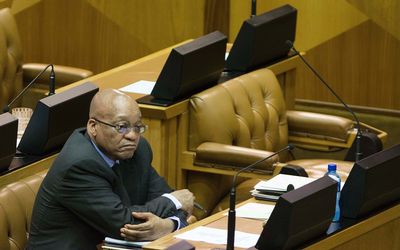THE spectacle of MPs trading base insults under the supervision of an appalling speaker may be entertaining television, but it should worry us. What was meant to be a critical discussion on the state of the nation address delivered more gutter sound bites than insightful commentary.
Opposition parties clearly relish President Jacob Zuma’s lack of depth and eloquence in the face of an economic crisis, but their own response does not inspire much confidence either. The economy is in serious trouble. SA risks not being able to meet even those expectations it could easily meet before.
Biting commentary on the president’s dreary speech is fine if it is laced with ideas, but many of the contributions lacked either bite or substance. Instead, the country heard a succession of personal attacks whose intention was to question the president’s already depleted personal credibility. While the looming elections may have had a lot to do with this, there is another, more worrying reason.
Many MPs appear to lack the depth of knowledge required to navigate a discussion on the economy. This is why they found it so difficult to interrogate the glaring lack of detail on both state finances and the economy in the president’s state of the nation address.
The country should be looking to MPs to probe the budget proposals that Finance Minister Pravin Gordhan will table on Wednesday. Instead, they might offer no more than the usual sweeping statements that either sycophantically support the minister or lambast his colleagues.
Lack of institutional depth is not a specific pillar of the matrix used by credit ratings agencies to determine a country’s creditworthiness, but it has an effect nonetheless. Investors and rating agencies want to know whether a country’s institutions can respond to its challenges and whether institutional checks and balances are in place. Parliament and other arms of the state, such as the judiciary, are among those institutions.
As members of the public, we should be looking to Parliament to hold the executive to account and to ensure it acts with urgency to address its shortcomings. The handling of the Nkandla scandal suggested Parliament has no such capacity.
President Zuma undertook in the state of the nation address to reduce public sector costs, ensure regulatory certainty, and cut red tape. In all three respects his speech lacked depth, detail or verifiable time frames. That is not unusual in presidential speeches, but Parliament last week lost an opportunity to insist that rhetoric be turned into reality.
This reflects another concern, which is the opposition’s limited readiness to govern. The decline in the ANC’s ability to govern is not being matched by improvements in the opposition’s ability to inform and lead South Africans in discussion and action on the real economy.
State debt continues to climb and has become more expensive following the disastrous effect of former finance minister Nhlanhla Nene’s dismissal in December. The demands on the state to deliver economic utopia are increasing, but its ability to meet these is diminishing.
The opposition needs to think seriously about its positioning, and the image it wants to project. If it wants to be seen as a serious contender for national leadership it needs to start acting in a way that inspires public confidence. To secure such confidence it needs to connect with the public on the basis of ideas, whether or not they are espoused inside Parliament.
On Wednesday Mr Gordhan will deliver his budget speech. We trust that MPs, on both sides of the house, will find time to read and reflect on the extensive and useful documents the Treasury provides. SA deserves genuine debate rather than personality politics.

President Jacob Zuma listens to the state of the nation debate in Parliament on Tuesday. Picture: TREVOR SAMSON
THE spectacle of MPs trading base insults under the supervision of an appalling speaker may be entertaining television, but it should worry us. What was meant to be a critical discussion on the state of the nation address delivered more gutter sound bites than insightful commentary.
Opposition parties clearly relish President Jacob Zuma’s lack of depth and eloquence in the face of an economic crisis, but their own response does not inspire much confidence either. The economy is in serious trouble. SA risks not being able to meet even those expectations it could easily meet before.
Biting commentary on the president’s dreary speech is fine if it is laced with ideas, but many of the contributions lacked either bite or substance. Instead, the country heard a succession of personal attacks whose intention was to question the president’s already depleted personal credibility. While the looming elections may have had a lot to do with this, there is another, more worrying reason.
Many MPs appear to lack the depth of knowledge required to navigate a discussion on the economy. This is why they found it so difficult to interrogate the glaring lack of detail on both state finances and the economy in the president’s state of the nation address.
The country should be looking to MPs to probe the budget proposals that Finance Minister Pravin Gordhan will table on Wednesday. Instead, they might offer no more than the usual sweeping statements that either sycophantically support the minister or lambast his colleagues.
Lack of institutional depth is not a specific pillar of the matrix used by credit ratings agencies to determine a country’s creditworthiness, but it has an effect nonetheless. Investors and rating agencies want to know whether a country’s institutions can respond to its challenges and whether institutional checks and balances are in place. Parliament and other arms of the state, such as the judiciary, are among those institutions.
As members of the public, we should be looking to Parliament to hold the executive to account and to ensure it acts with urgency to address its shortcomings. The handling of the Nkandla scandal suggested Parliament has no such capacity.
President Zuma undertook in the state of the nation address to reduce public sector costs, ensure regulatory certainty, and cut red tape. In all three respects his speech lacked depth, detail or verifiable time frames. That is not unusual in presidential speeches, but Parliament last week lost an opportunity to insist that rhetoric be turned into reality.
This reflects another concern, which is the opposition’s limited readiness to govern. The decline in the ANC’s ability to govern is not being matched by improvements in the opposition’s ability to inform and lead South Africans in discussion and action on the real economy.
State debt continues to climb and has become more expensive following the disastrous effect of former finance minister Nhlanhla Nene’s dismissal in December. The demands on the state to deliver economic utopia are increasing, but its ability to meet these is diminishing.
The opposition needs to think seriously about its positioning, and the image it wants to project. If it wants to be seen as a serious contender for national leadership it needs to start acting in a way that inspires public confidence. To secure such confidence it needs to connect with the public on the basis of ideas, whether or not they are espoused inside Parliament.
On Wednesday Mr Gordhan will deliver his budget speech. We trust that MPs, on both sides of the house, will find time to read and reflect on the extensive and useful documents the Treasury provides. SA deserves genuine debate rather than personality politics.




















Change: -0.47%
Change: -0.57%
Change: -1.76%
Change: -0.34%
Change: 0.02%
Data supplied by Profile Data
Change: -1.49%
Change: 0.00%
Change: -0.47%
Change: 0.00%
Change: -0.08%
Data supplied by Profile Data
Change: 0.61%
Change: 0.85%
Change: 0.20%
Change: -0.22%
Change: 1.05%
Data supplied by Profile Data
Change: 0.28%
Change: -0.32%
Change: 0.13%
Change: -1.57%
Change: -1.88%
Data supplied by Profile Data